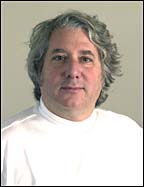 |

|

|
INSIDE IOWA STATE
January 18, 2002
Can we conquer terrorism?
 |
Robert Baum
Associate professor, religious studies
Terrorism is a tactic chosen by desperate people who feel powerless and
excluded. It has been used by groups that we are sympathetic to, like the
Sons of Liberty in the American Revolution as well as, in horrendous ways,
by the followers of Osama Bin Laden.
Bin Laden sought to polarize people, forcing the world to choose between
America and Islam. We must resist that. Islam is not the problem. If we want
to eliminate terrorism in the Middle East, then we must remain united in our
commitment to American civil liberties.
In the Middle East, we must work to eliminate the poverty and sense of
hopelessness that foster terrorism. We need a Marshall Plan for the economic
development of the Middle East, support of democratic movements within the
region, and a determined effort to achieve a just peace that ensures the
safety and well being of Israelis and Palestinians.
|
Ardith Maney
Professor, political science
Yes. Governors are tightening driver's license rules and wielding expanded
public health and safety powers. President Bush is running a more activist
government but hasn't yet gotten agreement about how to pay for it. Bush
needs to ask citizens for greater participation.
Communicating the need for sacrifice and civic engagement is a vital
precondition for successful wartime leadership, as Lyndon Johnson sadly
learned. We need to be creatively engaged in the world out of self-interest
and to assist people who share our values.
ISU can assist this process. We can't leave it to the government, McDonalds
and Hollywood.
|
 |
 |
Richard Mansbach
Professor, political science
Although there are a variety of steps that we can take that would reduce
anti-Americanism and terrorism here and overseas, it is unlikely that we can
eradicate the threat. There are several reasons for this. The first is the
nature of evolving technology, including the miniaturization of weapons and
rapid movement of people, things and ideas linked especially to the
micro-electronic revolution.
The second is the ballooning interdependence of peoples all over the world
and the consequent weakening of state capability and the sensitivity and
vulnerability of modern societies.
A third reason is the virtual impossibility of eliminating some of the key
sources of fanaticism, such as the growing gap in global wealth and the
presence of messianic religious and ideological ideas.
|
Helen Jensen
Professor, economics
A major concern in Iowa is the threat of bioterrorism on the food and
agricultural sectors. The deliberate introduction of an animal or plant
disease at the farm level, or a hazard at other points along the food chain,
could cause significant health and economic damage, as well as under-mine
public confidence in the safety of the food supply.
However, increased biosecurity on farms and food production and distribution
facilities, and increased aware-ness of the potential for problems by
producers and the public can help deter and thwart occurrences. In the
longer run, investments in biosecurity systems, including improved testing
and food handling, will help to reduce the risks.
The bottom line is that we will continue to use our resources to provide a
safe and nutritious food supply; however, there is new urgency to reduce
poverty and other problems that lead to increased terrorism threats.
|
 |
|

Ames, Iowa 50011, (515) 294-4111
Published by: University Relations,
online@iastate.edu
Copyright © 1995-2001, Iowa State University. All rights reserved.
|
|